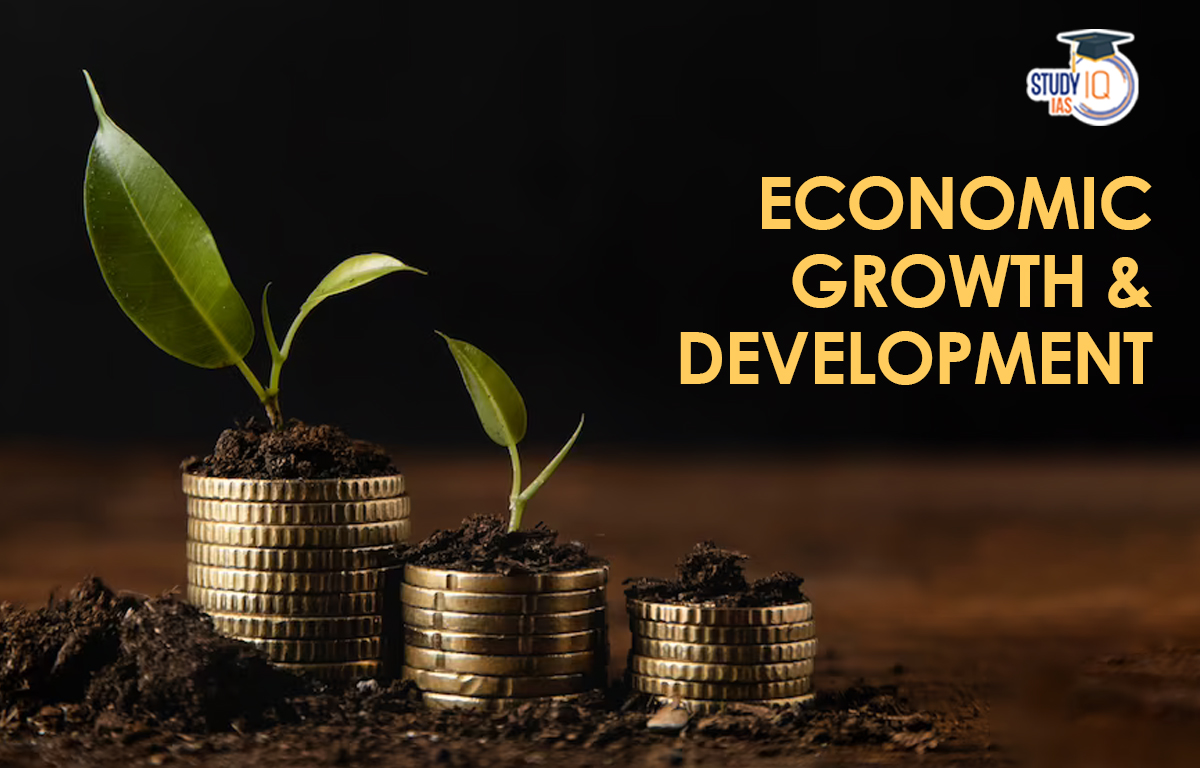Table of Contents
Context: India became a lower-middle-income country in 2007 and continues to remain in that category.
More in News
- Over 18 years, its per capita income has grown from $1,022 to $2,700, but the threshold for upper middle-income status is $4,516.
- The IMF projects India’s per capita income to reach $4,195 by 2029, making an upgrade likely in the next decade but not by the end of this decade.
Challenges in India’s Economic Growth and Development
- Middle-Income Trap: India has remained a lower-middle-income country since 2007.
- Moving to an upper middle-income and later high-income status requires sustained high growth.
- Many countries (e.g., Brazil, and South Africa) have struggled to transition due to stagnant productivity and weak economic policies.
- Uneven Regional Development: Western and southern states (e.g., Telangana, Karnataka) have higher per capita incomes and are nearing upper middle-income status.
- Eastern and northern states (e.g., Bihar, Odisha, West Bengal) lag behind in industrialization and per capita income.
- Economic power is concentrated in industrialized states, while political power often resides in poorer regions, leading to policy misalignment.
- Employment and Labour Force Challenges: India’s working-age population is rising, but job creation in the formal sector is insufficient.
- Agriculture employs ~45% of the workforce but contributes only ~18% to GDP.
- Female labour force participation (~25%) is among the lowest globally.
- Low Investment in Human Capital: Low public spending on education (~2.9% of GDP) and healthcare (~1.5% of GDP).
- Poor learning outcomes in schools affect workforce productivity.
- Weak healthcare infrastructure, and high out-of-pocket medical expenses.
- Slow Industrialization and Manufacturing Growth: Manufacturing contributes only ~17% to GDP, compared to China’s 28%.
- Heavy reliance on imports in key sectors (e.g., electronics, semiconductors).
- Labour laws and land acquisition challenges deter large-scale industrial growth.
- Infrastructure Bottlenecks: High logistics costs (~14% of GDP) compared to global standards (~8–10%).
- Power shortages and slow urban planning hinder industrial growth.
- Financial Sector Issues: Non-Performing Assets (NPAs) reduce bank lending capacity.
- MSMEs face difficulty in accessing credit due to strict lending norms.
- Fiscal Challenges and Rising Inequality: Low tax-to-GDP ratio (~11–12%) limits government revenue.
- High government spending on subsidies reduces funds for infrastructure and social welfare.
- Growing income inequality threatens social stability.
- Climate Change and Environmental Issues: Rising pollution, water scarcity, and extreme weather threaten agriculture and industry.
- India is among the top greenhouse gas emitters, facing global pressure to cut emissions.
- Global Economic and Geopolitical Risks: Supply chain disruptions, trade restrictions, and geopolitical tensions affect exports and investments.
- Overreliance on certain trade partners creates economic vulnerabilities.
Solutions for India’s Economic Development
- Adopt the “3i” Approach:
- Investment: Increase investment in key sectors such as manufacturing and infrastructure to boost economic growth.
- Infusion of Global Technology: Encourage the adoption of advanced technologies to enhance productivity and competitiveness.
- Innovation: Foster a culture of innovation through R&D investments and support for startups.
- Strengthen Manufacturing Competitiveness: Implement targeted industrial policies like expanding Production Linked Incentive (PLI) schemes to emerging sectors such as green hydrogen and AI hardware.
- Reduce input costs by rationalizing import duties on raw materials.
- Improve Logistics Efficiency: Execute plans under the National Logistics Policy to reduce logistics costs from 14% of GDP to global averages of around 8%.
- Enhance Human Capital Development: Invest in education and skill development programs that focus on creating high-productivity jobs, aligning with global value chains (GVCs).
- Promote Export-Led Growth with Diversification: While traditional export-driven strategies may face challenges due to global protectionism, diversifying into new markets or sectors can help maintain growth momentum.
- Address Structural Weaknesses: Upgrade outdated infrastructure like transportation networks and utilities.
- Improve public institutions’ efficiency by streamlining reforms.
- Encourage Labour Intensive Manufacturing & Exports: Focus on labour-intensive industries that can drive employment generation while enhancing exports in these sectors.
- Strengthen Competition & Leverage Digital Technologies: Implement strong antitrust laws to foster competition among businesses, promoting innovation.
- Utilize digital technologies for social mobility, talent development, and access to credit facilities through platforms like Aadhaar-based financial inclusion initiatives.
Read this article below to get the complete information about Economic Growth and Development in detail.
Economic Growth and Development Concept
Economic Growth and Development are two important concepts that are closely related to each other. While economic growth refers to an increase in the production and consumption of goods and services over time, economic development encompasses a wider range of factors such as social welfare, equality, and sustainability. Both concepts are crucial for the progress and prosperity of a nation and are often used interchangeably, although they have distinct meanings..
Difference Between Economic Growth and Development
Here is a tabulated form highlighting the key differences between Economic Growth and Development:
| Economic Growth | Economic Development |
| Refers to an increase in the production and consumption of goods and services over time | Encompasses a wider range of factors such as social welfare, equality, and sustainability |
| Focuses on quantitative aspects such as GDP, employment, and productivity | Focuses on qualitative aspects such as education, health, and environmental sustainability |
| Assumes that growth will automatically lead to the development | Emphasizes that growth needs to be inclusive and sustainable to bring about development |
| Examples include an increase in GDP, exports, and industrial output | Examples include improvements in healthcare, education, gender equality, and environmental protection |
It’s important to note that while economic growth is necessary for development, it is not sufficient on its own. A country can have high levels of economic growth but still experience high levels of inequality, poverty, and environmental degradation. Therefore, a focus on economic development is necessary to ensure that growth is inclusive and sustainable in the long term.
Economic Growth and Development in India
India is one of the fastest-growing economies in the world, with a rapidly expanding middle class and a young population that is increasingly well-educated and aspirational. Over the past few decades, the country has made significant strides in economic growth, particularly in sectors such as information technology, services, and manufacturing.
However, despite this growth, India still faces significant challenges in terms of economic development. The country continues to struggle with high levels of poverty, inequality, and unemployment, particularly in rural areas. Additionally, issues such as inadequate infrastructure, low levels of education and healthcare, and environmental degradation pose significant obstacles to sustainable development.
To address these challenges, the Indian government has implemented a range of policies and programs aimed at promoting economic development. These include initiatives such as the Make in India campaign to boost domestic manufacturing, the Digital India Program to expand access to digital infrastructure, and the Swachh Bharat Abhiyan to improve sanitation and environmental sustainability.
Economic Growth and Development Measures of the Indian Government
Here are some of the flagship measures taken by different governments for Economic Growth and Development in India.
| Government | Flagship Measures | Time Period |
| Jawaharlal Nehru | Five-Year Plans, Industrialization, Land Reforms, Public Sector Enterprises, Green Revolution | 1947-1964 |
| Indira Gandhi | Bank Nationalization, Garibi Hatao, Emergency | 1966-1977 |
| Rajiv Gandhi | Computerization, Telecommunications, Modernization, Panchayati Raj, National Policy on Education | 1984-1989 |
| Narasimha Rao | Liberalization, Privatization, Globalization, LPG Reforms, Economic Liberalization | 1991-1996 |
| Atal Bihari Vajpayee | Golden Quadrilateral, Sarva Shiksha Abhiyan, National Highways Development Project, Pradhan Mantri Gram Sadak Yojana | 1998-2004 |
| Manmohan Singh | Right to Information, National Rural Employment Guarantee Act, Unique Identification Authority of India, National Food Security Act | 2004-2014 |
| Narendra Modi | Make in India, Digital India, Skill India, Swachh Bharat Abhiyan, Ayushman Bharat, Atmanirbhar Bharat | 2014-Present |
Balanced and Unbalanced Theory of Economic Development
The balanced and unbalanced theories of economic development are two contrasting views on the process of Economic Growth and Development.
Balanced Theory of Economic Development
The balanced theory of economic development suggests that Economic Growth and Development require balanced growth across different sectors of the economy. According to this theory, growth in one sector leads to increased demand for goods and services produced in other sectors, leading to further growth and development. This process creates a virtuous cycle of growth and development, with each sector contributing to the development of the others. The emphasis of this approach is on achieving an equitable distribution of resources and opportunities across different sectors of the economy.
Unbalanced Theory of Economic Development
On the other hand, the unbalanced theory of economic development suggests that economic development requires a massive injection of resources and investment into a few key sectors of the economy. According to this theory, growth and development are not necessarily self-sustaining and require external intervention to jump-start the process. Once the initial investment is made, growth and development will spread to other sectors of the economy. The emphasis in this approach is on achieving rapid growth in selected sectors of the economy, which will eventually spill over into other sectors.
Economic Growth and Development UPSC
Economic Growth and Development is an important topic for UPSC as it is a crucial aspect of the Indian economy and is covered extensively in the UPSC Syllabus for both Prelims and Mains exams. Aspirants preparing for the UPSC exams can benefit from StudyIQ UPSC Online Coaching and UPSC Mock Test that cover various aspects of Economic Growth and Development in India.


 Top 10 Economies in the World 2025, Chec...
Top 10 Economies in the World 2025, Chec...
 Minors Bank Account above 10 Years: Chan...
Minors Bank Account above 10 Years: Chan...
 Creative Economy in India, Current Situa...
Creative Economy in India, Current Situa...





















